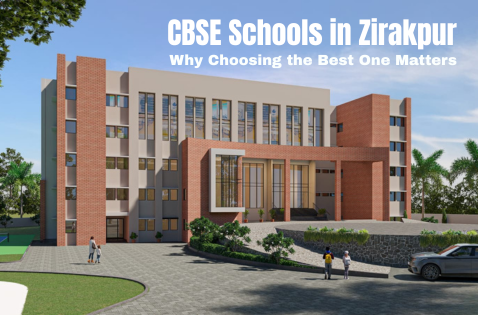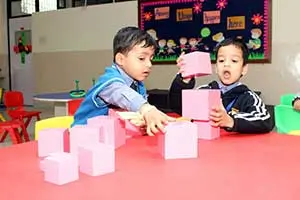Education must go beyond memorization and test preparation in today’s fast-paced world. It ought to assist kids in developing the abilities necessary for success in the real world. This is where Integrated Project-Based Learning (PBL) shines. It’s a student-centered teaching method that blends real-world challenges with interdisciplinary learning, combining science, math, language, and arts into meaningful, collaborative projects.
Unlike traditional classroom models, where subjects are taught in silos, integrated PBL encourages learners to think critically, explore creatively, and make connections across disciplines. This shift fosters deeper understanding, stronger problem-solving abilities, and a lasting love for learning.
Integrated PBL is a key component of the curriculum at Dikshant International School, one of the top schools in Zirakpur that is close to me. It aligns perfectly with the goals of the CBSE board, making it ideal for families seeking CBSE schools in Dera Bassi or surrounding areas that emphasize holistic, future-ready education.
PBL in CBSE: Dikshant’s Learning Approach
In India, CBSE schools are adapting to the demands of a world that is changing quickly. Schools like Dikshant International are pioneering this shift by incorporating integrated project-based learning into the CBSE curriculum from nursery to 12th.
At Dikshant, learning is designed to reflect real-life experiences. Students engage in multi-disciplinary projects that combine subjects like mathematics and environmental science or language and social studies. These projects are not theoretical- they’re rooted in real-world issues, such as sustainability, innovation, or local community challenges.
Students are empowered to take charge of their education with this approach. They ask questions, conduct research, analyze information, and present solutions. Through this process, they build critical thinking, creativity, and collaborative skills-qualities essential in both academic and professional environments.
Critical Thinking at Dikshant School
Critical thinking is one of the most vital skills children can develop. In an age where information is just a click away, students must be able to evaluate data, question sources, and solve problems- not just recite answers.
From assessing the credibility of online content to making decisions in team projects, critical thinking helps students navigate the complexities of modern life. It also enhances independence, resilience, and adaptability traits in an ever-evolving world.
Furthermore, critical thinking fuels innovation. When learners are encouraged to explore different perspectives, connect ideas, and think outside the box, they become more creative and confident communicators. That’s why top-rated CBSE schools in Dera Bassi, like Dikshant International, integrate these skills into everyday learning.
Empowering Minds: Dikshant’s Integrated PBL Journey
Dikshant International doesn’t treat project-based learning as a supplement but integrates it into the very fabric of the academic program. Every grade level engages in meaningful, interdisciplinary projects that reflect real-world concerns and develop essential life skills.
Take the “Smart City” initiative by middle school students. They combined science, environmental studies, math, and social science to design sustainable urban models. From using renewable energy sources to proposing smart traffic solutions, students explored urban planning while learning about budgeting, teamwork, and presentation skills.
In the lower grades, the “From Farm to Table” project taught students about food sourcing, health, and local agriculture. They interviewed farmers, mapped food miles, created infographics, and presented their findings to peers and parents. These activities promoted research, communication, and empathy.
Such initiatives set Dikshant apart from other international schools in Dera Bassi and higher secondary schools in Zirakpur by offering a well-rounded and immersive learning experience.
Dikshant’s Focus on Confidence & Lifelong Skills
The advantages of integrated PBL go far beyond academics. Students at Dikshant gain real-world skills that shape their confidence and emotional intelligence.
By leading projects, presenting ideas, and solving meaningful problems, children learn to communicate effectively and take initiative. These leadership opportunities nurture independence and self-assurance.
Working in diverse teams helps students develop empathy, patience, and respect for different perspectives. They learn how to resolve conflicts and collaborate in today’s global, team-driven workspaces.
Most importantly, integrated learning ensures future-readiness. Students leave school not only with knowledge but also with the ability to adapt, think critically, and engage with the world meaningfully.
More Than Marks: What Sets Dikshant School Apart
One of the most significant decisions a parent makes is selecting a school. While board affiliations like CBSE and academic scores are important, they don’t tell the whole story.
Parents should look for schools that promote holistic development, emotional well-being, and life-ready skills. Ask about project-based learning, interdisciplinary projects, and how the school measures success beyond test scores.
At Dikshant International, these questions are part of the school’s vision. As one of the top-rated schools near me, it offers students from kindergarten through senior secondary years a rich, engaging, and purposeful education.
Conclusion: Learning for Life, Not Just Exams
In the 21st century, students need more than facts- they need to learn how to think, adapt, and innovate. Integrated project-based learning offers this and more. It empowers students to be curious, collaborative, and courageous thinkers.
At Dikshant International School, a leading CBSE school in Zirakpur and Dera Bassi, integrated PBL is not just an educational approach’s a philosophy. It prepares pupils for life, not just exams.



